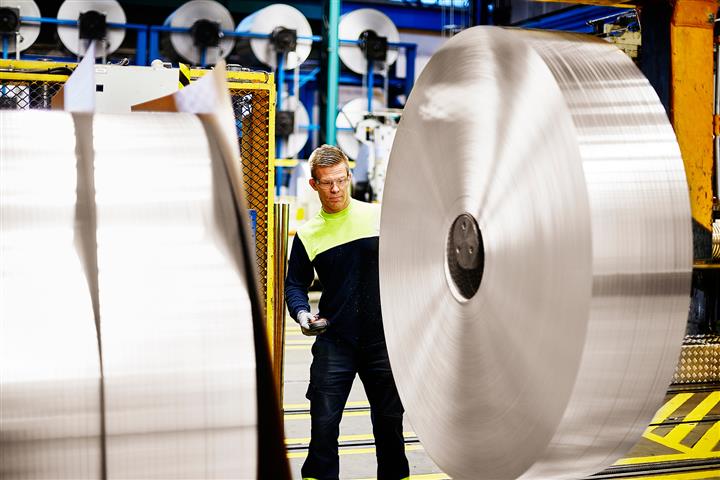 Sweden’s Gränges Gets With Carbon, Electrification Trends in Auto Supply Chain
Sweden’s Gränges Gets With Carbon, Electrification Trends in Auto Supply Chain(Yicai Global) Nov.15 -- Amid the decarbonization and electrification trends in the global auto industry, Swedish aluminum producer Gränges is taking action after putting sustainability on its agenda.
“It’s impossible for firms to focus solely on their own business,” Gränges Asia Pacific President Xu Guotao told an industry forum on Nov. 11 in Shanghai. “They should actively participate in the whole eco-system.”
The eco-system of the auto parts industry faces a complex evolution, Xu said. For Gränges, which has been in China, the world’s largest auto market, for 25 years, this is a challenge but also an opportunity.
“Car companies with sustainable goals will force suppliers to meet carbon standards,” said Li Dongfei, a research, development and innovation manager, when asked about the impact of China’s dual carbon goals upon Gränges. “If we act early, we can benefit early.”
Chinese President Xi Jinping revealed in September last year the country’s ambitious target of reaching carbon neutrality by 2060, with carbon dioxide emissions peaking by 2030.
With carmakers including BMW, Audi, Mercedes Benz and General Motors, as well as auto parts producers such as Valeo, Continental and ZF having announced carbon neutral schedules, “customers are increasingly recognizing the importance of using sustainable materials, and they are more concerned about our carbon emissions strategy,” Li said.
In the electric vehicle market, it means new solutions for heat exchangers are needed to cool batteries, power electronics and other electrical components, Xu said, adding that efficient thermal management is important for battery performance and longevity. Further weight reduction, new designs as well as stronger and more corrosion resistant materials will be required.
“Gränges has a pipeline of solutions for customers’ emerging needs,” Xu said. Taking the heat exchanger system in new energy vehicles as an example, they tend to be smaller, lighter and smarter than those on petrol vehicles, he said.
Xu also called on players in the aluminum industry, including manufacturers and scrap dealers, to work together to ensure that scrap ends up back with producers.
China Challenge
“China's carbon emissions level in the aluminum industry is higher than the world average,” Xu said at the forum. “Gränges faces a tough challenge to achieve carbon-emissions goals in China.”
Carbon emissions from the aluminum production stage is about 10 times more than in the processing or later stages, which is even higher in China as it uses coal as the main source of energy.
Gränges will try to secure a steady supply of aluminum using renewable energy, improve the production process with technological breakthroughs, and increase the share of recycled aluminum, Xu said.
In the firm’s Shanghai operations, where a high number of alloys for brazed heat exchanger applications are produced, strict sorting of recycled aluminum is required to make sure the materials fit well in the specific alloys produced, Xu said. In Asia, the Chinese market for recycled aluminum has continued to increase, and Gränges operations increased the volume of sourced recycled aluminum significantly last year, though from a low base.
Gränges accounted for 22.5 percent of sourced recycled aluminum last year, 2.5 percentage points higher than the Stockholm-based company’s sustainability framework and 2025 targets.
Despite fierce competition from local rivals and the impact of Covid-19, Gränges has grown in China. In the Asia Pacific, third-quarter sales rose 4 percent to 17.5 kilotonnes, up from 16.8 kt a year earlier.
Founded in 1896, Gränges got 45 percent of its business from the auto industry last year, while it supplied 20 percent of the aluminum used for blazed aluminum heat exchanges globally.
The Asia Pacific is its second-largest market, behind North and South America, but will slip to third behind Europe after the company’s acquisition of Aluminum Konin. Gränges Aluminum Shanghai, which has annual capacity of 120,000 tons of heat exchanger rolled aluminum, is the firm’s largest production base in Asia.
Editor: Peter Thomas